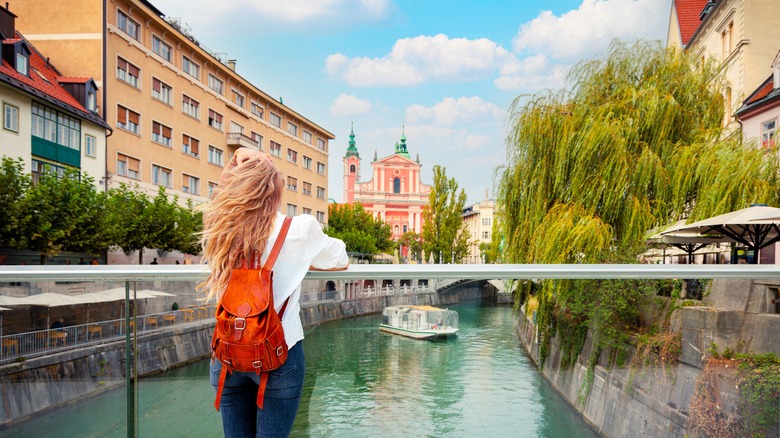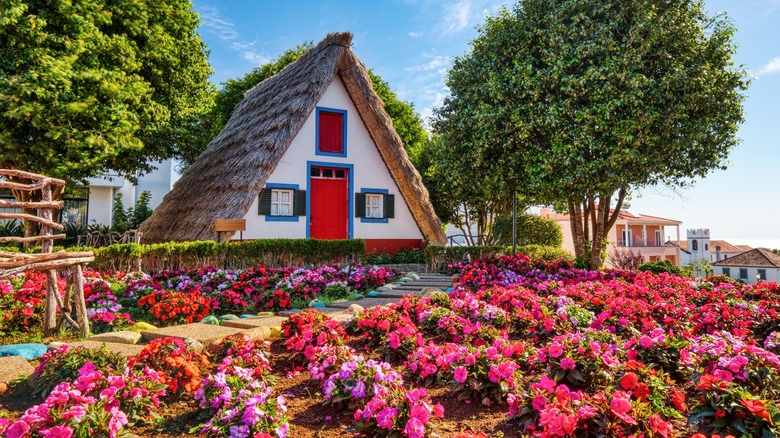These 5 European Countries Are Considered The Safest And Most Welcoming To Travelers
Traveling is all about getting out of your comfort zone, but there are good and bad ways to do that. Getting lost in a new city can feel simultaneously uncomfortable and exciting, but trying to translate your way through filling out a foreign police report? That's not fun. Safety and friendliness are great factors to consider when looking for vacation destinations. To help you plan carefree trips where you feel welcome, we've rounded up some of the friendliest and safest places in Europe, from the welcoming locals in Iceland to the safe cities in Portugal.
Ranking factors like crime and friendliness is inherently subjective. It's impossible to speak about an entire country without making a few generalizations, let alone when ranking the safety of an entire continent. So, here's one grand generalization: Europe as a whole is relatively safe, provided you take reasonable safety precautions. In fact, staying safe in most of the world is as simple as learning the best safety tips and keeping your wits about you.
Each individual traveler will have their own opinion and experiences to consider when thinking about the safest and most welcoming places to visit, and we're not here to tell anyone they're wrong. We're here to combine our experiences with those of the thousands of globetrotters we've spoken to along our travels. After taking into account things like crime rates, visitor polls, and first-hand experience, these five countries stand out of the crowd and are ready to welcome you with open arms.
Iceland
The undisputed leader in traveler safety, Iceland has been ranked the safest country in the world by the Global Peace Index for the past 14 years. Safety alone won't get you to the top of this list, but Iceland also delivers a uniquely welcoming tourist experience from the top down. The country's largest airline company — Icelandair — once offered a promotion called the "stopover buddy," which paired customers flying to Europe with Icelandic locals who shared their interests. You could get tours of geothermal springs, learn traditional cooking techniques, and even go backcountry skiing with the company's CEO. While the straight faces and lack of smiling at strangers might feel jarring to those accustomed to big smiles from service workers, most tourists have nothing but nice things to report about Icelandic hospitality. The relative lack of crowds compared to other European destinations can make things feel even more inviting.
The main reason Iceland tops our list is safety. In many ways, the most dangerous thing about Iceland is the wind. There are many reasons for the country's high safety score and dominance of the Global Peace Index's list. For example, the country is just 4,000 square miles larger than Portugal but has almost 10 million fewer residents. Its relative isolation and prosperity — not to mention one of the lowest unemployment rates on the entire continent — have combined to cultivate an incredible tourism pitch: safety, Viking history, and incredible natural scenery.
Ireland
Ireland ranks second on our list thanks to the fabulous combination of safety and a welcoming attitude toward travelers, although the Irish do have a slight reputation for being tough on new residents. Newcomers are sometimes referred to as "blow-ins"—an Irish term to describe an outsider. While it can be a difficult place to assimilate, this list is for travelers, and Ireland excels at hosting short-term trips.
Between bustling, walkable cities and towns and an impressive list of outdoor activities, Ireland would be worth a visit even if the locals were grumps. Luckily, that's not the case. The Emerald Isle frequently features on lists of the friendliest countries in Europe, and while you might have heard of an Irish goodbye, what about an Irish Welcome? The Irish Independent writes that it involves "a friendly smile, a helpful manner, and genuine interest."
Alongside feeling welcome in Ireland, you'll also feel safe here, whether you enjoy cities or stretch out and explore the entire country. Ireland is an incredibly safe place to rent a car, with the third lowest rate of road deaths in Europe. There's no better way to enjoy the Irish countryside than renting your own set of wheels. Once you get used to driving on the left side of the road, driving in Ireland is relatively easy. You can drive from coast to coast in less than three hours and leave your rental parked while you head off on a hike without worry.
Denmark
Happiness and peace often go hand in hand. Denmark knows that better than anyone, as the country is ranked second on both the most recent World Peace Index and the World Happiness Report. Western universities have even started teaching courses on Danish happiness, focusing on the idea of "hygge." There's no literal translation, but it vaguely means to find fulfillment in everyday moments, to take your time, relax, and enjoy the little things in life. Naturally, visiting the home of hygge will lend itself to enjoying a safe and welcoming state of mind. In Denmark, hygge museums and a feeling of the interconnectedness of all things are waiting.
Interestingly, the land of happiness doesn't necessarily translate to a warm welcome. You might find local people less likely to go out of their way to interact with a stranger here than in some other countries. The consensus is that this iconic Danish happiness is in large part an absence of discontent, an even-keeled approach to life instead of dramatic ups and downs. That long-term satisfaction is born through robust social systems and a sense of security. The Danish happiness is cultivated in large part because the country is so stable. When visiting this delightful Nordic country, don't expect people to break out in joyous songs on the street, but you can walk comfortably through Copenhagen and the Danish countryside knowing you're in good hands.
Slovenia
Slovenia is packed full of sneaky, little-known destinations waiting to be embraced. The country has a magnificent wine-making tradition, beachfront vacations along the Adriatic Sea, and magnificent Alpine mountain ranges. Travelers can head from place to place on public transport without fear; this country consistently ranks as one of the safest in the entire world. Even in some of the words safest countries, major cities can have their rough spots. In Slovenia, metropolitan areas lead the way.
Ljubljana, the country's capital and largest city, was recently ranked by New York-based Best Diplomats as the third safest city in Europe. Reviewers gave Ljubljana high marks for its emergency service response time, secure public transport, and well-planned public areas, like Tivoli City Park — 2 square miles of green a stone's throw from bustling downtown. The underrated city might be one of the most charming capitals in Europe, and there's plenty more to explore outside the city.
Slovenia has gone to painstaking lengths to welcome tourists the right way. National Geographic Traveler Magazine recognized the country as a leader in ethical tourism, crowning Slovenia as the world's most sustainable country. Safe, green, and friendly often go hand in hand here. More than 60% of Slovenia is covered in forest, and this spectacular country is packed with nature reserves, farms, wineries, and all the rest. Enjoy uncrowded hikes, rich wine, and friendly locals in big cities and small towns across the country.
Portugal
We'll round out our list with Portugal, the warmest climate of the countries selected for our list. Portugal consistently ranks as one of the best places for nomads to relocate in the world, thanks to its sunny skies, warm hearts, and delicious cuisine. A large reason for this high ranking is the Portuguese ability to make foreigners feel at home. One recent poll of migrants conducted by Expat Insider declared that Portugal has the most welcoming attitude towards foreigners worldwide. Voters on this poll were more focused on relocation than tourism, but 36% noted feeling at home immediately in Portugal. It's easy to feel at home when you feel safe, and the sense of safety is strong in Portugal. While their crime index ratings can't quite compete with Iceland, Portugal is still consistently ranked as one of the safest countries in the world.
If you're looking for an even lower crime rate, two Portuguese archipelagos — Madeira and the Azores — might make for an even better trip than the mainland. Madeira, considered a less crowded and just as stunning version of Maui, enjoys year-round comfortable weather, delicious wine and port, and mountains over 6,000 feet tall. The Azores are a group of volcanic islands known for their hot springs, beautiful waterfalls, and green scenery. Both destinations pack beautiful natural environments, all steps away from beautiful beaches, and both enjoy safety scores lower than the Portuguese mainland's already safe statistics.





